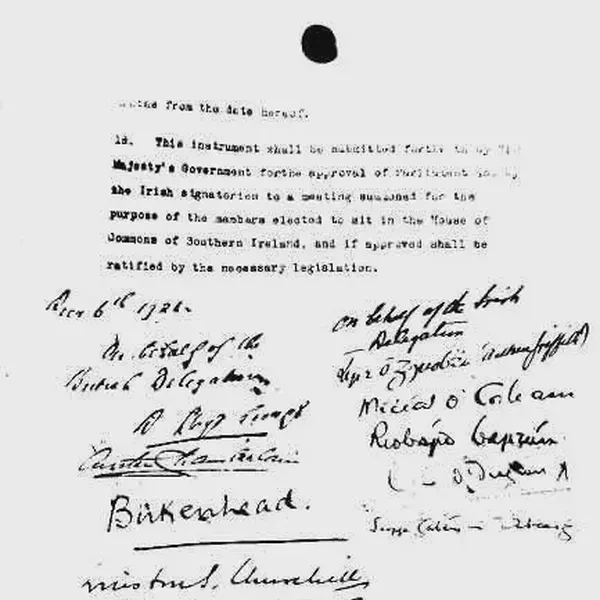On January 07, 1922 in Celtic History
Anglo irish treaty ratified, creating free state

Talks between the Republican leadership and the British government led to the Anglo-Irish Treaty in 1921, with the Irish delegation eventually agreeing to self-governing dominion status for the twenty-six counties in the Irish Free State.
The Treaty, however, was unacceptable to Republican hardliners who refused to settle for anything less than a united, independent Republic. The Treaty was ratified by the Dail on 7 January 1922, only to be followed by a civil war in the South between pro and anti-treaty factions even bloodier than the earlier conflict had been.
Michael Collins Murdered
Collins himself was killed by anti-Treaty Irregulars in August 1922.
The Anglo-Irish Treaty was an agreement signed on December 6, 1921, between representatives of the British government and leaders of the Irish Republic. The treaty marked a significant turning point in Irish history, as it led to the creation of the Irish Free State (now the Republic of Ireland) and the establishment of the border that divided Ireland into two entities.
Background
The treaty came about as a result of negotiations between British Prime Minister David Lloyd George and Irish leader Michael Collins, along with other representatives. The negotiations aimed to find a solution to the ongoing conflict in Ireland, which had been marked by the Irish War of Independence (1919-1921).
Key Provisions
The treaty had several key provisions, including the establishment of the Irish Free State as a self-governing dominion within the British Commonwealth, with full control over its own internal and external affairs. The treaty also allowed for the creation of a border between Northern Ireland (which remained part of the United Kingdom) and the Irish Free State.
Controversy and Opposition
The treaty was highly controversial, leading to a bitter and divisive debate within the Irish delegation and among the Irish public. It was accepted by some, including Michael Collins, but vehemently opposed by others, most notably Eamon de Valera, who saw it as a compromise that did not go far enough toward full Irish independence.
Civil War
The treaty’s ratification by the Dáil (Irish parliament) led to a split and eventually the Irish Civil War (1922-1923) between pro-treaty forces (led by the Provisional Government, including Michael Collins) and anti-treaty forces (led by de Valera). The civil war had a profound and divisive impact on Irish society.
Legacy
The Anglo-Irish Treaty laid the groundwork for the establishment of the Irish Free State in 1922, which later became the Republic of Ireland in 1949. The division of Ireland into two separate political entities persisted, with the border separating Northern Ireland from the Irish Free State (later the Republic of Ireland) becoming a contentious issue and the cause of further political and social complexities.
The Anglo-Irish Treaty’s creation of the Irish Free State marked the beginning of a new phase in Irish history, with the Free State gaining a degree of independence while remaining part of the British Commonwealth. The legacy of the treaty continues to be a subject of historical and political discussion in Ireland and the United Kingdom.
More From This Day
